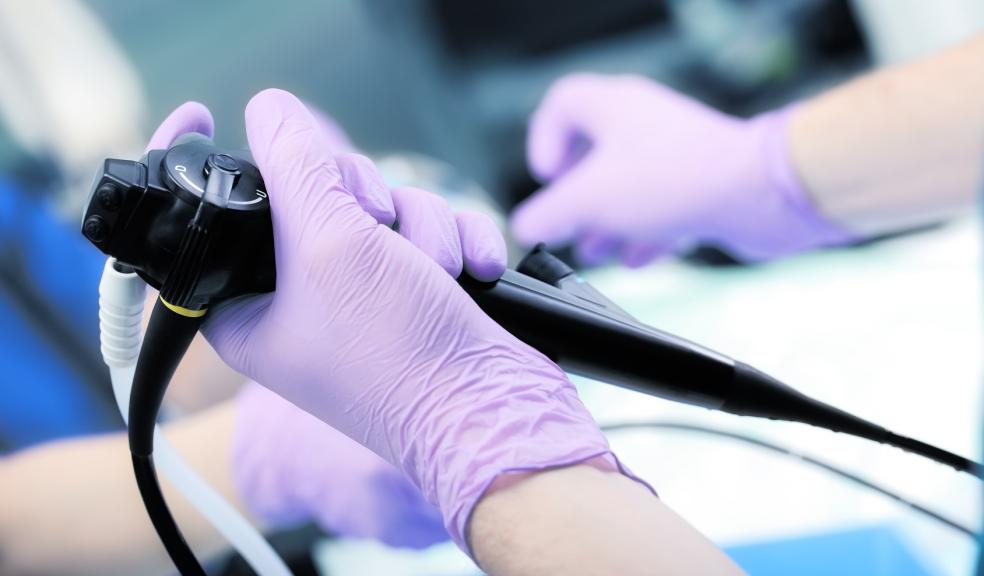
New diagnostic service brings faster diagnosis for suspected cancer patients
Patients with suspected cancer of the colon or bowel can now have greater choice of where they have their diagnosis, thanks to the introduction of a two-week colon and endoscopy service at Peninsula NHS Treatment Centre.
The service has been introduced to ensure that more patients with suspected cancer do not need to wait unnecessarily for a diagnosis. They can be reassured and if it is found that they do have cancer they can enter a care pathway in collaboration with University Hospitals Plymouth NHS Trust (UHP) early-on in the diagnosis.
Patients referred to Peninsula NHS Treatment Centre are seen first in the hospital’s Outpatient Department by one of its three colorectal surgeons. Patients then come back to Peninsula for an endoscopic test within two weeks. The time from initial consultation to results should be within two weeks.
If further treatment is required, patients attend UHP where cancer care takes place.
Care UK, Peninsula NHS Treatment Centre recently invested £2.6 million in a state-of-the-art Endoscopy Suite where a full range of endoscopic procedures take place including:
· Colonoscopy, used to examine your large and small bowel;
· Sigmoidoscopy, the examination of the large intestine using a rigid endoscope;
· Flexible sigmoidoscopy, where a flexible endoscope is used to look at the furthest part of the colon;
· Gastroscopy, where an endoscope is passed through the mouth and throat to check the stomach;
· Trans-nasal endoscopy, where a thinner endoscope is passed through the nose to investigate the stomach (Peninsula NHS Treatment Centre is the only hospital in the area offer this procedure).
Peninsula NHS Treatment Centre is one of a handful of hospitals in the country to have achieved Joint Advisory Group (JAG) accreditation for its endoscopy services at the first attempt.
Mark White, Hospital Director at Peninsula NHS Treatment Centre, commented: “We are delighted to be able to support NHS patients in the South West and our colleagues within the local NHS community. Living under the shadow of a suspected cancer is upsetting and stressful. The sooner a patient knows they are either in the clear, or have a cancer diagnosis which leads to timely treatment, the better.”
Five signs you may need an endoscopic investigation
An endoscopy is when a tube with a camera is inserted into your body through your mouth, nose or anus to help identify and diagnose the cause of a variety of symptoms.
Why might you need an endoscopy? Here are five signs to look out for and to discuss with your GP:
Stomach pain – if you are experiencing pain in your abdomen which is unusual or which lasts for more than a few hours, it could be symptomatic of a worrying or serious condition. You should see your GP who may refer you for an endoscopy procedure to diagnose the cause of the problem
Blood in your stools – this may be the sign of an infection or bowel cancer, which if caught early can be treated. If you notice any blood in your stool or when you wipe yourself after going to the toilet you should see your GP who may suggest one of the endoscopy procedures described below
Difficulty swallowing – also called dysphagia, this can be caused by a number of conditions ranging from an infection to cancer of the oesophagus. If symptoms persist you should see your GP quickly and discuss with them if an endoscopy is required
Acid reflux/heartburn – we have all suffered heartburn at some point and antacids help, but if you are experiencing heartburn or acid reflux regularly or over a long period of time it may be caused by an underlying condition. Long term acid reflux can also lead to Barrett’s oesophagus, where the abnormal growth of cells causes blockages. If your experience of acid reflux or heartburn is long term it should be discussed with your GP who may refer you for an endoscopy to investigate the cause of the problem
Irregular bowel movements, long term constipation or diarrhoea – sometimes these symptoms can be caused by a change in diet or lifestyle and may settle, but if you experience them for a long period of time they may be signs of something more serious such as IBD, colon cancer or an underactive thyroid. Speak to your GP who may think it is appropriate for you to have an endoscopic investigation.
Whatever your symptoms, always speak to your GP if you’re worried.














